#liverpool university press
Photo

«Cover Photograph taken on the outskirts of Coalisland, Co. Tyrone, 17 February 1980. It shows one of the earliest marches organized by the National H-Block/Armagh Committee and features many of the anti-criminalization campaign's key activists. Soon after this march, John Turnley (second row, second left) and Miriam Daly (first row, first left) were assassinated. In January 1981 Bernadette McAliskey (first row, second right) survived an assassination attempt. Two months later, Frank Maguire MP (second row, first right) died, leading to the election of Bobby Sands. In May 1981, Fergus O'Hara (first row, third right) was elected to Belfast City Council on an anti-H Block ticket. Photograph reproduced by permission of Derek Speirs.»
– From the back cover of Smashing H-Block. The Rise and Fall of the Popular Campaign against Criminalization, 1976-1982, by F. Stuart Ross, Liverpool University Press, Liverpool, 2011
#graphic design#photography#history#historiography#h block#control unit prison#book#back cover#john turnley#miriam daly#bernadette mcaliskey#frank maguire#fergus o'hara#bobby sands#derek speirs#f. stuart ross#liverpool university press#1980s#2010s
25 notes
·
View notes
Text
7 notes
·
View notes
Text
Pressed for Space: A Publisher's Urban Regeneration Project
Pressed for Space: A Publisher’s Urban Regeneration Project
Liverpool University Press’ ‘Pressed For Space’ project was a part of our bid to the University of Liverpool’s Environment and Sustainability Fund for 2022 to become the UK’s first carbon neutral University Press. We are delighted to say that our bid was successful and as part of the project, a portion of this money was set aside to create a garden out of the existing courtyard of our office…

View On WordPress
0 notes
Text
Categorically Jewish, Distinctly Polish by Moshe Rosman
Categorically Jewish, Distinctly Polish by Moshe Rosman
Polish Jewish History Reflected and Refracted
The Littman Library of Jewish Civilization
Moshe Rosman’s revolutionary approach has become a cornerstone of Polish Jewish historiography. Challenging conventions, he asserts that the ‘marriage of convenience’ between the Jews and the Polish–Lithuanian Commonwealth was a dynamic relationship that, though punctuated by crisis and persecution,…

View On WordPress
0 notes
Note
are hamsas a jewish thing? i see them all over jewish sites and in synagogues but i also see gentiles using/wearing them???
Short answer: Yes, hamsas are a Jewish thing, but they're not exclusively Jewish.
An open palm as a symbol is seen throughout the Middle East, and it is given many names and meanings. There is no consensus as to the origin of the symbol, but considering hand prints are seen even in paleolithic art all across the world, it wouldn't be that hard to see how a hand could become such an important symbol.
In Judaism, hands are often featured in artwork as the two hands of the Kohanim during the Priestly Blessing and as references to God's mighty hand when freeing the Jews from Egypt. Hamsas have been used as Jewish amulets since at least the Middle Ages, and there's evidence of hand symbology being used even earlier. The belief in Ayin Hara (The Evil Eye), which is often tied to Hamsas, is also a very old Jewish belief. It, too, is not an exclusively Jewish belief, but rather a belief common among Middle Eastern and Meditteranean cultures.
Not all Jews use the Hamsa as a symbol, and indeed many frown on it, seeing it as a superstition that is best not touched. However, it has been used for a long time by Sephardi and Mizrachi Jews, as well as more Kabbalistic Ashkenazi Jews.
Because of its appearence in both Jewish and Muslim cultures, the hamsa has become a symbol of Judeo-Islamic unity by some people. In 2009, the Hamsa Flag was envisioned as the flag of a united Israeli-Palestinian state.
In conclusion,
RATING: JEWISH (BUT NOT EXCLUSIVELY)
Further reading about Hamsas, Amulets, and the Evil Eye:
Sagiv, Gadi. “Dazzling Blue: Color Symbolism, Kabbalistic Myth, and the Evil Eye in Judaism.” Numen, vol. 64, no. 2/3, 2017, pp. 183–208. JSTOR, http://www.jstor.org/stable/44505334.
SABAR, SHALOM. “From Sacred Symbol to Key Ring: The Ḥamsa in Jewish and Israeli Societies.” Jews at Home: The Domestication of Identity, edited by SIMON J. BRONNER, Liverpool University Press, 2010, pp. 140–62. JSTOR, https://doi.org/10.2307/j.ctv1rmjz2.8.
Hamsa (Aish.com)
Amulets and Talismans (YIVO encyclopedia)
The Hamsa In Jewish Thought and Practice (Times of Israel)
Hamsa Flag (Ayin Press)
353 notes
·
View notes
Note
Hello, my love!
I, unfortunately, missed your requests being open (six pages of a thesis is kicking my ass right now) but when they’re open again, is there a chance you could write another Dad!Price fic?
Since the last one felt so personal to me, would it be possible to have Price helping his daughter through Uni stress? Maybe she asks him to help her on her thesis? Lord knows I could use some inspo/assistance on mine!
Of course, if this is too late then feel free to delete it! I just wanted to pop in and drop a request off before I either, A: forgot about it, or B: missed your requests being open the next time :(
Sending so much love and hugs <3
Late Night Cookies
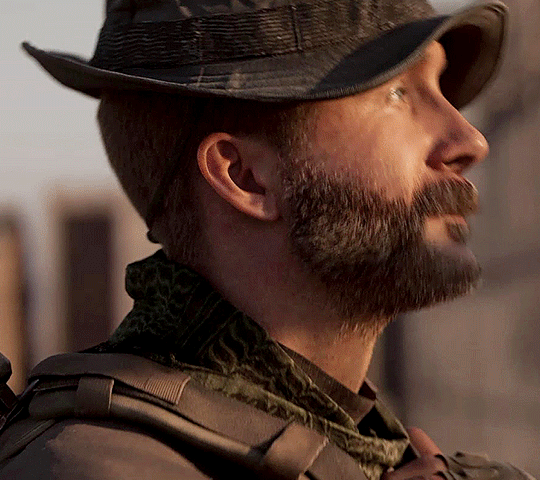
PAIRING: John Price x Daughter!Reader
SYNOPSIS: Stressed and still awake, you go to grab food from the kitchen before you get right back into your work. Your father talks some sense into you over a nostalgic recipe.
WORDCOUNT: 1.5k
WARNINGS: Stress around school, grades, papers, etc. but 90% fluff and comfort
A/N: I'm so glad you sent something in, Love! So good to hear from you again!
*I do not give others permission to translate and/or re-publish my works on this or any other platform*

Your eyes were blurry and your hands were shaking, the table light shining too brightly in the stillness of your bedroom as a cold breeze wafts through the cracked window.
The words swirled on your computer screen, sitting in front of you as your head slipped forward. Letters bleed into nonsense sentences that even a genius couldn’t make sense out of. There were weights on your fingers—keeping them stuck to the keys.
“And, thus,” your garbled speech slips out, reading the line you’d just written; eyes squinting as your headache flares. “A-and…thus…”
Shaking your head, you pull back and press your palms into your eyesockets, your spine flopping back with an audible crack as it straightens from hours of hunched torture. A groan slips out of your lips.
“Shit,” you growl, sighing harshly.
University, while necessary, was really your worst enemy right now—you’re constantly stressed and getting little sleep; when was the last time you’d eaten? Pages upon pages of typed research seer your eyes while closed. Only in this tight silence of your room were you able to hear the small sounds of the TV on in the house as it wafts in from under the line of your door.
Your hands slip down your face as you stare blankly at your ceiling, eyes burning with fatigue. The muffled shouts from football games play in your ears.
Humming, you push back from your desk and stand, stumbling for a second as your numb legs get prickles of electricity shooting through them. You needed food, water, even. Then you can get back into it. On the way out you snatch a blanket from the frame of your bed, wrapping it over your shoulders to preserve heat.
Like a snail, you shuffle over the hardwood before finally pushing out into the hallway with only a small bump into the door frame. Hissing, the darkness of the house was good, and before long you’d grumbled past the large form laying on the living room couch in need of any form of sustenance. So brain-fried, you end up completely missing the small questioning ask of your name as Liverpool fights off another rival on-screen. Slashing colors dance across the darkness.
The hand on your shoulder, though, you can’t miss.
“Sweetheart?” Your father’s voice brings you back from blankly nodding off into his chest as he turns you around. You jerk back with a rapid fluttering of your eyelashes.
“Yeah?” Your voice slurs, croaky, and you rub again at your cheeks with the corner of your blanket. “What’s up?”
Blue eyes blink down at you in shock at your state, small noise made in the back of the large man’s throat. “Hell’s this, then? Thought you were sleeping already.”
“Sleeping?” The tone is incredulous, a bit of sanity leaking back into your speech. You look up into your dad’s face and his tight beard; his eyebrows are curled in. “I’m not even close to being done. I can’t sleep yet.”
John blinks slowly, gaze darting from the sizable bags under your eyes to the redness of your sclera—the veins that reach for your irises like infectious fingers. His grip on you tightens.
“When’s the last time you took a break, Love?” He asks slowly, taking you by the shoulders and bending down a little. He looks concerned. “It’s bloody dark out.”
You stare and huff a sheepish, tired, smile while your dad’s expression tightens with exasperation. He blinks in disbelief at your non-answer, answer.
“Fuckin’ hell…c’mon, Sunshine, off to bed.” Your head is already shaking.
“I’m hungry.” John sighs, and the air ruffles your hair. But he relents and before you know it there’s a hand on the back of your shoulders corralling you into the kitchen. You lean heavily into your father’s side, and his fingers curl over your opposite arm.
A soft kiss is pressed to your head.
“How long have you been up, eh?” You yawn and lick your lips. Flinching when John flicks the kitchen light on. Burrowing down into your blanket, you seep in his heat like a greedy lizard. “Sweetheart?”
“Dunno,” you’re guided over to the island and plopped down into a chair. “I need to finish my work.”
He chuckles and you slouch over to fold your arms, resting your chin on them. “Well, I suppose you plan on finishing it half-asleep?”
John opens the fridge, looking over the small remnants of supper. He frowns and turns to look at you as your face lays sideways on your limbs. You blink slowly at him.
“...Maybe,” you grumble, face hot.
Your father grunts and closes the fridge, turning back around and crossing his arms.
“No more of this, eh?” He begins, glaring and infecting his words with that infectious authority. “After we get you fed, you’re off to bed. That’s that.”
You’re about to protest before your dad interrupts with a stern growl of your name. You grit your teeth and shamefully dip your head. There’s a moment of silence where the outside sounds of wind and creaking can be heard—the entire world asleep beside the father and daughter in the dim kitchen.
John tilts his head and softens his face; feet carrying him over. Stopping beside you, he places his hand on your scalp and pats you gently, rubbing his thumb into your hair. Lashes flutter, and your body sags into the counter even more. Your father kisses your head and whispers, “You need your sleep, Sweetheart. This’ll do you no good. Pace yourself, you’ll get it done—I promise, yeah?”
“How do you know?” Your voice mutters, hesitation finally showing itself. Eyes stare at the table, red and dry.
Your father chuckles and you glance back. He’s smiling in his own way, wrinkles showing and eyes crinkling with amusement.
“You’ve gotten this far. My girl’s not one to give it up. And even if you do,” he stands and pats your shoulder before he heads to the pantry. Your expression leaks slight confusion as he opens the door. “We can figure it out together. It’s not the bloody end of the world. It’ll pass.”
Your internal anxiety eases at your parent's reassurance, his casual surety more of a blanket than the one you already swaddle yourself with. The subtle anxious shaking of your fingers stills after a moment of cognition. Stuffing down another yawn, you feel a warmth burn in your heart at the words and you smile.
“When did you get all wise?” You tease, seeing John take out various ingredients as you watch. He scoffs.
“The second I got the call I was needed in hospital and had a damn daughter.” You laugh.
“Alright, then,” your sarcastic reply slips out, and John chuckles lowly. After a moment you can’t stop your curiosity, no matter how much your limbs stay heavy. “What are you doing?”
A large bowl had been placed on the counter with a dull thunk. Blue eyes darted at you before measuring cups were spawned next to the previous object.
“What’s it look like, then?” John’s finger casually points to a recipe that had been set up on the wall, a thin and damaged piece of paper with chicken scratch; stains, and crumpled corners. You blink at it in recognition.
“...Cookies?”
“You want chips or cinnamon?”
Watching with wide eyes, you clear your throat and utter, “Uh, c-chips, I guess?” John grunts and focuses with a calm face. The recipe had been a sort of inside joke between the two of you.
When your dad was off on assignment for long periods, you’d always make him a batch when he was set to leave and when he came back—a kind of soothing gesture to ease the uncertainty. To let him know you’d be alright without him here.
He made them for you when you were sick or feeling bad. You blink quickly to dispel the sudden wetness of your eyes.
“You helping?” John asks, not turning to you, as he dumps flour into the bowl. “Won’t taste right if you don’t.” A cheeky tone hits your ears.
Standing, you shuffle over and grab at the chocolate bag, digging inside and stealing a few before your dad can stop you. He gives you a fake glare, huffing under his breath before smirking to himself.
Your body leans into his side and you giggle as he rubs his beard into your head.
—
Hours later, you rest limply against your dad’s shoulder on the living room couch, empty plate on the coffee table and the TV low. You breathe softly and get the sleep you both deserve and need—of course, the work would start back up tomorrow, but it always would. Having your dad in your corner was the thing to keep you upright; your rock.
John looks down and watches you with a deep well of affection and ease. He kisses your head before his arms reach around you, lifting with no problem.
He carries his little girl, because that was what you would always be, off to bed and tucks you in. Snapping off your desk lamp with a small sigh of contentment and a low hum.

TAGS:
@luuvbuzz, @emerald-valkyrie, @anna-banana27, @blueoorchid, @cryingnotcrying, @writeforfandoms, @homicidal-slvt, @jade-jax, @frazie99, @elmoees, @littlemisstrouble, @alpineswinter, @phoenixhalliwell, @idocarealot, @lavalleon, @facelessmemories, @h-leigh, @20forty9, @glitter-anon-asks, @emily-who-killed-a-man, @neelehksttr, @aeneanc, @escapefromrealitysm, @i-d-1-0-t, @pparcxysm, @hawkscanendme, @caramlizedtomatos, @konigsleftkidney, @sanfransolomitatm, @maelstrom007, @jemandderkeinenusernamenfindet, @pheobees, @glitterypirateduck, @uselsshuman, @fan-of-encouragement, @halfmoth-halfman, @ghostlythunderbird, @I-inkage, @pukbadger, @kopatych11, @0nceinabluem00n, @cocrorapop, @knightofsexyness, @abnormalgeil, @smallseastone, @jacegons, @330bpm-whiplash, @simon-rileys-housewife, @4-atsu, @tiredmetalenthusiast
#cod#cod x reader#cod x you#cod mw22#mw2#call of duty#mw2 2022#call of duty mw2#x female reader#captain johnathan price#john price fic#john price#captain john price#captain price#cod mwii#john price x reader#john price x you#john price cod#john price call of duty#john price x female reader#call of duty x reader#call of duty x you#cod fanfic#cod x female reader#mw2 x reader#cod mw2#mw2 fanfic
544 notes
·
View notes
Text
Ruben Dias/Trent Alexander Arnold x Reader - Dark Rivarly Part 8/15
What a perfect day to release a chapter hahaha. 🤣 It's derby day between Man City and Liverpool and with the beef going on between Trent and the team my story becomes more and more unrealistic, or what do you think? 🤔
Could Trent ever make peace with somone like Ruben? Let alone allow Ruben to date his sister?
Part 9 and 10 are already out on my Patreon!

Reader is Trent Alexander Arnold's twin sister. The two have been inseparable since childbirth, more so now when Reader is fresh out of university looking for a job, crashing at her brother's place whilst doing so. One day Reader gets a job offer that she cannot refuse, however it would mean working for her brother's biggest rival in football, Ruben Dias.
Enjoy!
"These are actually pretty good."
"Really?" You perked up where you sat on the sofa in Ruben's hotel room. He was sitting next to you.
"Yes and the press seems to love the outfit you choose for Ruben, look."
Miranda turned her Ipad around, showing you the published images of Ruben, wearing the outfit you had picked out for him.
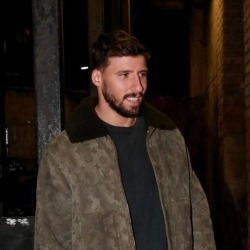

"I'll admit that I had my doubts at first, but the reviews have all been great. Good job Y/N."
"Um, thank you Miranda." A complement from her felt like a lifetime achievement.
"I'm gonna call the photographer that took these and see if he can send me the negatives. We might be able to use them on Instagram to summarize the weekend. Miranda left the room to make the call, leaving you alone with Ruben, who had barely acknowledged you this morning.
"I better pack my bags." You said, rising from the sofa. Ruben however, refused to move his legs out of the way to let you pass.
"Excuse me?" You groaned. It wasn't funny, neither of you were laughing. "Ruben?"
His legs wouldn't budge, and you were getting agitated. "What the he'll are you doing, move your..."
Ruben drew back his legs just as you were about to swing at them with your own. This caused you to stumble forwards, almost tripping yourself.
"What was that for?" You frowned.
Ruben's expression was emotionless as he stood, and for the first time the height difference between you was intimidating.
"I...I just wanted to go to my room and pack my bags." You stuttered.
Ruben exhaled. "We need to talk first."
"Talk about what exactly?" You crossed your arms.
"The way you left me last night, it was unprofessional." He said.
"Ruben, I told you that I came down with something." Which was a lie, but it was the best one you could come up with on such short notice.
"And what exactly was it that you came down with?" He asked.
"What do you mean?"
"Well you seemed fine when you left my side at the party. What made you suddenly wanna run off Y/N?"
"Ruben, for the third time, I wasn't running, I just needed to get back to the hotel and lie down."
"So that's where you did it?"
"Did what?" You frowned, his tone spiteful to you.
Ruben shifted in his stance, crossing one arm over the other. "Y/N, I expect you to take your job seriously. For you to then run off with some guy...."
"I didn't run off with some guy."
"Don't lie to me Y/N, John saw you!"
The echoes of his words bounced off the walls. The room fell silent.
Ruben's eyes searched your face, he was angry and wanted answers, rightfully so. "Who is he Y/N, an old flame from your university days?"
"Ruben."
"No." He shook his head. "Don't tell me. It's none of my business." He walked over to the windows, running a hand through his hair.
"Ruben, it's not what it looks like. That guy, he is my...."
"Just know if you ever pull something like that on me again...." He said, slowly turning to you. "I won't be giving you any second chances, understood? Do your job from now on or the next time you're fired."
"There. The photographer gave me the thumbs up. He'll be sending me the...." Miranda stumbled into the room but paused at the sight of you and Ruben. "Everything alright?"
You were staring blankly at each other, something heavy forming in the base of your throat. Your voice shook when you spoke. "I have to pack my bags." You said and ran off into your room, gasping for air once you stood behind closed doors. You were gasping for air from the unstoppable flood of tears.
You were considering your life choices on the journey back to London. What if you just moved aboard and started a new life in some foreign country? No one would know you and you wouldn't have to lie about who you were. You'd be nothing and therefore be someone.
"Y/N! You're back early."
You stepped into Grandma's shop carrying your suitcases. You had forgotten your keys to her apartment but was glad to be welcomed by Jennifer at the front desk. However, her initial joy of seeing you quickly faded. "Oh my god, you're soaking wet. Is it pouring outside?"
"Just a drizzle." You murmured, as she rounded her desk to help usher you inside. "Is my grandma here? I forgot my keys."
"She's in her office, sorting out a golden suit. You won't guess who it's for." She giggled.
"Trent."
Her smile withered. "How did you know?"
You removed your soaked coat. Your shirt beneath had also been ruined.
"Oh my god, tell me about your weekend." She gasped. "London Fashion Week, was it as exciting as they make it to be? And your boss, was she happy with your work?"
"He." You corrected.
"What?"
"My boss is a he, and no he wasn't happy with my work."
"Oh my god. I'm so sorry Y/N. Is he high maintenance when it comes to fashion?"
"No, he's just a fucking dickhead."
"Language."
Grandma walked into the room, pinching a dozen sewing needles between her teeth.
"But he is a dickhead Grandma. And I don't care anymore, I'm not going back to work for him."
Grandma spat out the needles in her mouth, all the pins dropping soundless to the floor. "Well you're not coming back to work for me!"
"But where else am I supposed to go?"
"Home. To your mother, and tell her she's failed to raise her children."
"Ha ha, very funny."
"I'm serious Y/N, you're not staying with me. I'm getting tired of your tardiness, not to mention that furball you've got running around my apartment."
"What does Whiskey Jr, have to do with any of this?"
"He stinks, just like your attitude towards authority."
"I don't have an attitude towards authority. "
The bell above the front door rang in the distance. "Guys?"
"No, tell that to your current boss. I've overheard you talking, I bet he's done with your tardiness as well."
"Hey, guys?"
"What are you talking about Grandma, you don't even know my boss and if you did you would agree that he is a fucking piece of...."
"Y/N, please!"
Your argument with grandma was interrupted by Jenny's objections. She stood by the shop entrance, greeting the customer that had stepped through the door. He was soaked with rainwater from head to toe.
"You have a new client." She said, cheeks as red as they come. You on the other hand, couldn't find the words to speak and so grandma stepped in. "Can I help you sir, we're not open for much longer."
Ruben stepped forward. "No....I mean yes. I want to speak to Y/N."
"My granddaughter?" She frowned. "And who might you be, young man?"
You shook your head as Ruben met your eyes. However he went ahead anyway. "I'm Ruben, Ruben Dias, her boss."
"Oh. My. Days!"
You saw Jenny bouncing up and down in the corner of your eye.
"There's no way." She squealed. "There is no fucking way."
"Jenny please." You groaned, begging her to spare Grandma who hadn't been as quick to put two and two together.
"Your boss is Ruben Dias? Of all people." Jenny was clearly overjoyed by the drama unfolding before her. "Y/N, you're basically working for the enemy."
"Please don't be so dramatic". You sighed.
"Does Trent know? He's got to know, right?"
"Trent?"
You looked to Ruben as the name escaped his lips. His eyebrows furrowed. "Is that who you were with in London? Is that the name of your boyfriend, Trent?"
"Ha!" Jenny snorted, slapping a hand against her mouth. "You ran into Trent in London? Oh the drama. I can't."
"For fuck sakes Jenny!"
"Y/N!" The room fell quiet as Grandma's voice rose above all. "Language."
"But grandma..."
"No buts." She said, forcing your silence. "Now." She stepped up to Ruben, examining him. "This young man. Your boss? He has come here to speak to you, let's hear what he has to say."
It was a nightmare come true. Even Ruben seemed a bit taken aback by Grandma's demeanor. However he did gather the courage to address you as if you were the only two people in the room.
"I came here to apologize." He said. "For being a dickhead to you this morning."
Jenny snorted somewhere behind you, however grandma shot her a glance that made her fall back.
"You have the right to do and see whoever you want. I was just jealous and upset that you chose to do so on the night of my friend's gallery opening. For some reason I really believed that the two of us were...."
"No way." Jenny gasped, once again interrupting you. "You're fucking him too?"
"Oh for the love of..." You grabbed Ruben's arm, pulling him aside, into Grandma's office in the back room. There the two of you were left alone, however this game was getting old, the game of Ruben hurting you then crawling back, begging you to forgive him.
"There's something you should know about me." You said, wanting to get it over with. Ready to get it over with.
"Alright." Ruben nodded. "Tell me."
It was now or never.
"That guy your friend saw me with last night wasn't my boyfriend, or an old flame from my university days."
"No, who was he then?"
Another one bites the dust, you thought. Telling the truth meant that you were going to lose Ruben, just like the truth made you lose your old friends. You sighed before you spoke. "He is my brother Ruben, my twin brother."
"Oh, okay." There were clear signs of relief coming across Ruben's face, a slight twitch in the corner of his lips.
"His name is Trent, Trent Alexander Arnold. You might recognize the name since..."
"Wait." His expression went stiff again, carved by a deep frown. "Did you say Trent Alexander Arnold? As in..."
You nodded. "Yes, THE Trent Alexander Arnold. Liverpool's right back, however you might know him better as the guy that got booked for trying to punch you out the last time Man City played Liverpool."
Ruben's snort was unexpected. "Tried to, is the right word for what he did."
It made you gasp, as well as playfully nudge his arm. "I'm being serious."
"Trust me Y/N, I'm also trying to be serious. So you're telling me you're related to Trent Alexander Arnold, your twin brother to be exact?"
"Yes. I'm the oldest, if you must know."
Ruben's bright eyes searched your face. But it was unclear to you what had suddenly lightened his mood.
"Is this the reason?" He asked."
"What reason?"
"Why don't you want to be with me? Because of who your brother is. My "rival" in the football world?"
"Well that and the fact that you are my employer which would label our relationship as highly inappropriate."
"Yes, but it's mainly because of your brother, no? You worry about what he will think of you, of us. It's why you had him take you home the other night, because you didn't want the two of us to meet, no?"
You nodded. "He doesn't know that I'm your stylist. And I don't think that I want him to. The truth would send him through the roof." You still wondered why it hadn't sent Ruben through the roof, what was his angle?
"Y/N, I don't give a fuck about who your brother is?" He said this in a way that shook your core. Ruben then stepped forward, grabbing your face between his hands, tilting your head upwards. "Can we stop pretending that what we have between us isn't real?" He chuckled. "Can you just accept the fact that I want you and you want me Y/N?"
"You want me to run into your arms?"
He frowned. "What?"
"Like the girl in the painting." You smiled. "He's waiting for her to run into his arms."
"Yes." Ruben nodded. "Exactly. Come to me, run into my arms."
You crashed into his lips instead, with Ruben initiating it by pulling your face towards his. Just like that you we're back to square one, the game between you having stepped into a second round. And the next round was guaranteed to involve less tears and more fistfights.
#fanfiction#football imagine#ruben dias#man city#manchester city#footballer imagine#footballer x reader#ruben dias x reader#football angst#ruben dias imagine#trent alexander arnold x reader#trent alexander imagines#trent alexander arnold#liverpool fc#liverpool football club
36 notes
·
View notes
Text
NHLPA launches a new program to help players prepare for life outside of hockey
i.e. dad yelling at u to get a real job bc ur etsy shop aint be bumpin forever

the kids are getting a high school guidance counsellor and co-op term! what colour is ur parachute nursey

no wonder sabres on the rise oko's media hits so beautifully eloquent. they got smartypants mini gm at the helm
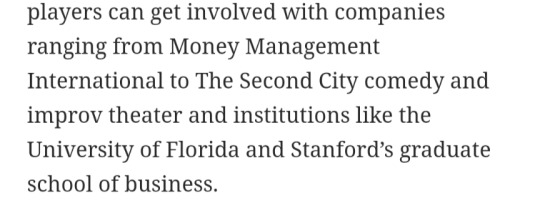
i just find this so interesting and wonderful ...and like if a big hockey butt wants to come hit me up for improv classes i'm not complaining🫠 imma make a union actor (nate. realistic) two time emmy winner (sid. dream on u don't have that ass) outta u
full article under cut:
Early in his time in the NHL, Darnell Nurse says he did not notice a lot of players talking about what to do after hockey. Going into his ninth season, the chatter is now normal.
“People are curious as to what there is outside the game and what you can do to prepare yourself,” Nurse said.
Plenty of players have taken it upon themselves to prepare for the future, like Zdeno Chara getting his real estate license and others finishing college degrees or exploring business opportunities. The NHL Players’ Association on Thursday launched a program that gives its members the chance to do a personality analysis and delve into real estate, business or other avenues while still in the league.
The hope is to help them develop interests outside of hockey while playing and ease the transition to life afterward.
“It’s something that’s been missing a little bit,” veteran center Lars Eller told The Associated Press. “It’s kind of well known that one of the struggles for a professional athlete is the transition on to the next thing once he’s done with his professional career. And this platform helps you with that transition, and it’s something you can start even while you’re still playing so you can sort of hit the ground running once you’re done.”
New union boss Marty Walsh made helping former players one of his top priorities. His arrival in March coincided with a process two years in the making, after player feedback indicated the desire for more assistance outside of hockey.
The result is the NHLPA UNLMT program. Retired defenseman-turned-psychologist Jay Harrison is available to do an assessment, and players can get involved with companies ranging from Money Management International to The Second City comedy and improv theater and institutions like the University of Florida and Stanford’s graduate school of business.
Former goaltender Rob Zepp, who’s spearheading the program as the union’s director of strategic initiatives, said an extensive survey provided the building blocks for something that was designed to be 1-on-1 and customized for players to figure out what might interest them.
“What we’ve seen so far it really runs the gamut: anything from enhancing one’s personal brand to starting a podcast to taking these certificate-level courses in real estate, in entrepreneurship, in business, in leadership, communication skills, networking skills,” Zepp said. “We have players that are interested in or are currently pursuing commercial real estate avenues or farming ventures or construction.”
Eller, Nurse and Buffalo captain Kyle Okposo are among the players who have tried UNLMT so far. Okposo has already graduated from Stanford’s business leadership program, while Eller has spoken with Harrison and taken some of the courses offered.
“They’re not waiting until people’s careers are over,” said Nurse, who is still in his prime at 28. “It’s something that you can dip your feet into and grab a hold of while you’re still playing and giving you resources and opportunities to kind of figure out what you want to do.”
Zepp got a degree from the University of Waterloo and an MBA from the University of Liverpool the old-school way — tapes and textbooks sent by mail and tests taken in front of a proctor — while playing mostly in the minors and Europe before before 10 games with Philadelphia in 2014-15. He felt like having something to study made him a better goalie and understood there was plenty of idle time on the road.
Eller, who is a silent partner involved with helping start-up businesses, thinks the same way.
“We, as players, we have — not a lot of freedom once the season is starting — but we do have a lot of free time,” said Eller, who scored the Stanley Cup-winning goal for Washington in 2018 and is a pending free agent at 34. “It’s a huge positive if you have something else that you can take your mind off of hockey and do something productive with that time.”
Walsh got to know several Bruins alumni when he was mayor of Boston and has since talked to other former players and come away with a mandate to protect guys beyond their time on the ice.
“When they played, they gave it their all, and a lot of them didn’t really have anything after that,” Walsh said. “They didn’t make big contracts. They really didn’t have a strong pension system. A lot of them, even going back further than that, lost stuff. We can’t let that happen again.”
#nhlpa#kyle okposo#darnell nurse#lars eller#edmonton oilers#colorado avalanche#buffalo sabres#zdeno chara#boston bruins#marty walsh#annieQ hockey thoughts
111 notes
·
View notes
Text
The chapter of Royston Ellis meeting the Beatles is so wild.
He first hits on George at the Jacaranda. George responds to this with a casual “oh, you’d love my friends” and brings him to Gambier Terrace:
Also dropping into the Gambier Terrace pit was a special guest, Royston Ellis, “King of the Beatniks.” The bearded bard, who featured in TV documentaries and press articles whenever an offbeat teenage angle was needed, was in Liverpool to read his poetry at the university on June 24/25, and he swiftly found himself drawn into the Beatles’ company. The conduit was George, who (with nothing else to do while John, Stu and Paul were in school) was hanging around the Jac when the wandering coffee-bar poet traipsed in, drawn by hip radar to “the happening place.” Avowedly “trying everything,” Ellis was an active bisexual in this period of his life and he took an immediate fancy to George: “He looked fabulous with his long hair and matelot-style striped T-shirt, very modern, which is why I deliberately spoke to him. I was nineteen and he was seventeen and we clicked right away.”15
George took Ellis, his typewriter and his duffel bag back to Gambier Terrace to meet John and Stu. A rapport was quickly established and Ellis was invited to “crash” for a few days—yet another occupant for the filthy back room.
Then Ellis hits it off with John and Stu and wants them as a backing band:
Ellis says he developed a particular rapport with John and Stuart and that they discussed poetry, art and London. When he left, they spoke of doing it again sometime: “We were talking about how I wanted a band to come to London and back me on my Rocketry performances, and they were thrilled at the idea.” Art school studies finished the following Friday, July 1, marking the end of Stu’s fourth year and John’s third and last because the college was waving him goodbye. The exam results, when they came through on August 1, were just as expected: John failed and was out, Stuart passed the NDD, for which he received a certificate. The option was there for him to do a fifth year and attain the highest available qualification, the Art Teacher’s Diploma (ATD), akin to a degree and entitling him to become a teacher … but both he and John were pondering a period as prospectors, and doing something again with Ellis was a definite possibility.
So much so, Ellis is responsible for the first* two mentions of the band in the newspaper:
As for Ellis, so much was he enthused by the possibility of appearing with them again that he soon got the Beatles their first mention in a music paper. It was the July 9 edition of Record and Show Mirror, where a supercilious little article about “the bearded sage of the coffee bars” ended “he’s thinking of bringing down to London a Liverpool group which he considers is most in accord with his poetry. Name of the group? ‘The Beetles’”
….A born publicist, Royston Ellis knew how to manipulate a follow-up, writing a letter for publication that clarified a point in the first. He expressed his intention to find a group that would join him on TV appearances with Bert Weedon and the Shadows, and reiterated, “For some time I have been searching for a group to use regularly, and I feel that the ‘Beetles’ (most of them are Liverpool ex-art students) fill the bill.”
John and Stu decide to go to London on their own to join Ellis…but then chicken out:
By July 10, at the end of his three-year art school vacation, John had arrived at a key decision in his life: he would try to earn his living from the guitar. “I became a professional musician the day I got a red letter from the art college saying ‘Don’t bother coming back next September,’ ” he later said.31 Cyn would remember, “John decided that this [music] was very definitely the life for him. All the ideas that everyone else had for him of making an impact on the art world faded into the back of beyond with incredible rapidity, and with almost no regret at all. Aunt Mimi was distraught. Her view of his future couldn’t have been blacker at that time.”32
These events coinciding, it seems John and Stu decided to head south and hang out with Royston Ellis. Allan Williams is emphatic on the matter: he says John and Stu “split the Beatles and went down to London.”33 Norman Chapman would remember Stu asking him for a lift through the Mersey Tunnel one day so he (or he and John) could hitchhike to London—“They wanted to go down to London and become involved in this poetry-music scene.” Beat poets led a nomadic life by definition. Ellis lived for periods in all sorts of places, but his main base was still his parents’ house, at 31 Clonard Way, Hatch End, Pinner, Middlesex, a pleasant detached villa with the name Denecroft. This was the address he gave John while staying at Gambier Terrace. When Ellis arrived home one day his mother said he’d missed a visit from his “beatnik friends from Liverpool.” He never knew how many or who had come, but—as insane as it appears—John and Stu (and/or as Ellis always thought—hoped—George) had hitched the best part of two hundred miles, taken the trouble of locating his house in leafy Metroland, not stayed or left a message and then gone home again, never returning or making further contact. It makes no sense, but there it sits, illogical and incomplete.
Allan Williams remembers them being “back in Liverpool within a week, because it didn’t work out,” at which point the Beatles “reformed” as if they’d never been away. With bookings only every Saturday, it’s conceivable they did all this without missing one, and perhaps that was always the intention. However, while three independent witnesses (Ellis, Williams and Chapman) all remember something happening, none of the Beatles ever mentioned it—though in their interviews they talked with candor about everything. So it must remain in doubt, an intriguing puzzle unlikely to be solved.
There are two additional curiosities that may or may not be incidental. One is that, in the last days of July, a group of Liverpool art school students, apparently including John and Stu, went to London (or tried to go) to see a Picasso exhibition at the Tate Gallery. Second, and most fascinatingly, a set of photographs taken at this very time (mid-July 1960) in Stu and John’s studio-bedroom-slum at 3 Gambier Terrace includes several people they knew but not John and Stu themselves—perhaps because they were on the Hatch End trip. It was published on July 24 in the national Sunday rag the People in a sensation-splash headlined THIS IS THE BEATNIK HORROR. It’s as if a man on a flaming pie was pointing down at Flat 3, Hillary Mansions, Gambier Terrace, Liverpool 1. In six months, three Beatles moved in and the fourth was hanging out, the nation’s best-known beat poet had come here to get them high, and now, when a Fleet Street journalist and photographer were looking to substantiate a load of old tosh about dirty beatniks—reportage that could have been cooked up anywhere in the country—they landed in Stu and John’s room.34
Though hugely amusing, the feature had one unfortunate side-effect: because the address was given (a “three-roomed flat in decaying Gambier Terrace in Liverpool”) and some of the occupants (“well-educated youngsters”) were named, the landlord gave the tenant, Rod Murray, notice to quit. On August 15, everyone—Rod, Diz, Ducky, Stuart, John and sundry other bodies who’d joined them—would be out on the street.
—Mark Lewisohn’s Tune In, Ch 15 (May 31–Aug 15, 1960)
And Lewisohn is just like yup nothing to see.
So what the hell happened here? Was it just a school trip? Or was it a deliberate split?
#royston ellis#beat poetry#beatniks#tune in#1960#early liverpool#bug mysteries#i think about this once a week and just found the bit again#mine#mark lewisohn#reading tune in#prebugs#*i think they may have found an earlier mention since tune in printing#i have a june newspaper clip date in my timeline#john and stu#young george#june 1960#queer bugs#reading riding so high#joe mentions the dates of royston’s liverpool university appearance#june 24 1960 and davies says the first beetles mention in the newspaper is june 11#so theres some conflict there when was the first#just learned royston ellis died earlier this year#but kerouac website writers reached him in 2020 and he still claimed they got the BEAT ideat in the name from him#theyve got a clipping from june 5 with silver beetles#but lewisohn references a june 2 clipping with the A (beatles)#so thats too early for royston maybe they were deciding and flipflopping he helped settle on one i can see that#lalala i cant read its first mention in a music paper rather than a general newspaper
101 notes
·
View notes
Photo
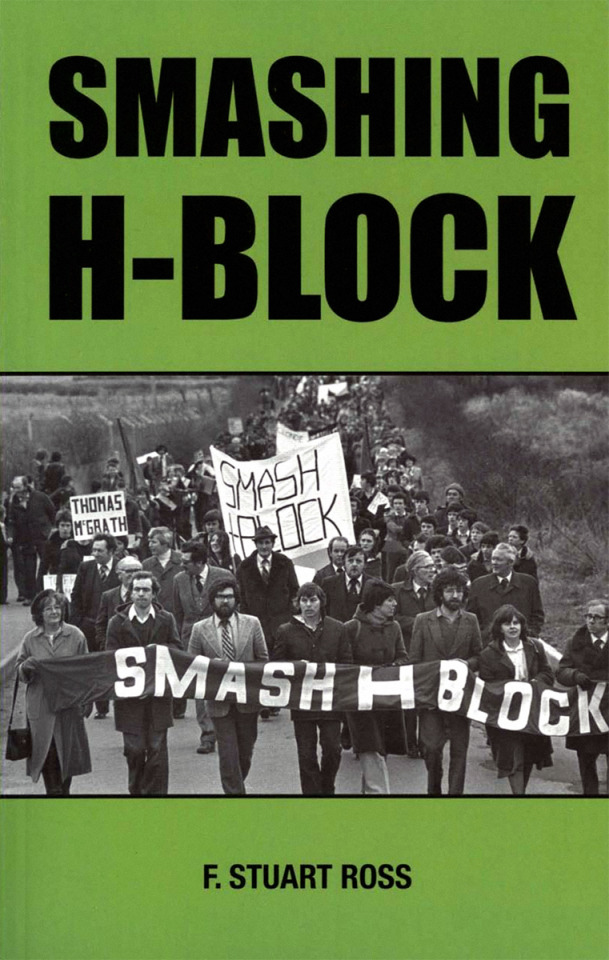
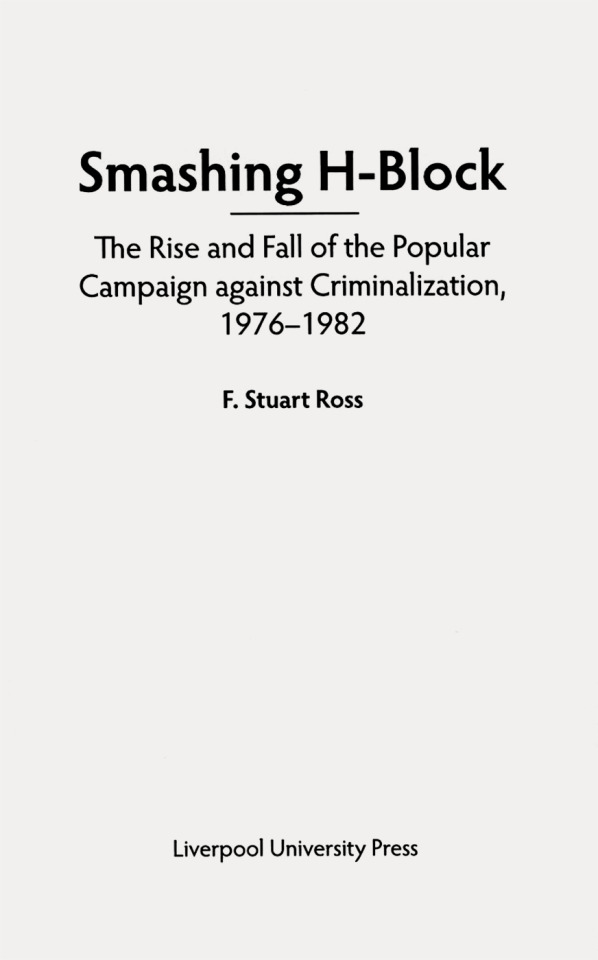


F. Stuart Ross, Smashing H-Block. The Rise and Fall of the Popular Campaign against Criminalization, 1976-1982, Liverpool University Press, Liverpool, 2011. Cover design by Emily Wilkinson
#graphic design#history#historiography#h block#control unit prison#book#cover#book cover#f. stuart ross#bobby sands#emily wilkinson#wogd#liverpool university press#2010s
24 notes
·
View notes
Text
THIS DAY IN GAY HISTORY
based on: The White Crane Institute's 'Gay Wisdom', Gay Birthdays, Gay For Today, Famous GLBT, glbt-Gay Encylopedia, Today in Gay History, Wikipedia, and more … April 7



529 Constantinople : Emperor Justinian I re-wrote Roman Law, making it distinctly Christian and stating that all same-sex acts are contrary to nature and punishable by death.

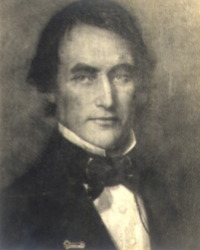
1786 – On this date William Rufus King, the U.S. Representative from North Carolina, Senator from Alabama, and the thirteenth Vice President of the United States was born (d.1853). Historians have argued about the extremely close relationship that King had with President James Buchanan.
King was close friends with James Buchanan, and the two shared a house in Washington, D.C. for fifteen years prior to Buchanan's presidency. Buchanan and King's close relationship prompted Andrew Jackson to refer to King as "Miss Nancy" and "Aunt Fancy", while Aaron V. Brown spoke of the two as "Buchanan and his wife". Further, some of the contemporary press also speculated about Buchanan and King's relationship.
Buchanan and King's nieces destroyed their uncles' correspondence, leaving some questions as to what relationship the two men had, but surviving letters illustrate the affection of a special friendship, and Buchanan wrote of his communion with his housemate. Buchanan wrote in 1844, after King left for France,
"I am now solitary and alone, having no companion in the house with me. I have gone a wooing to several gentlemen, but have not succeeded with any one of them. I feel that it is not good for man to be alone; and should not be astonished to find myself married to some old maid who can nurse me when I am sick, provide good dinners for me when I am well, and not expect from me any very ardent or romantic affection."
While the circumstances surrounding Buchanan and King have led authors such as Paul Boller to speculate that Buchanan was "America's first homosexual president", there is no direct evidence that he and King had a sexual relationship

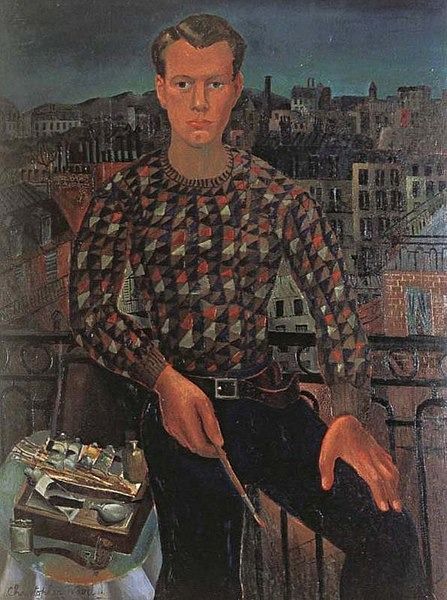
Wood Self-portrait
1901 – John Christopher Wood (d.1930), often called Kit Wood, was an English painter born in Knowsley, near Liverpool.
Christopher Wood was born son of Doctor Lucius Wood. He briefly flirted with medicine and architecture at Liverpool University before pursuing an artistic career.At Liverpool University, Wood met Augustus John, who encouraged him to be a painter. The French collector Alphonse Kahn invited him to Paris in 1920. From 1921 he trained as a painter at the Academie Julian in Paris, where he met Picasso, Jean Cocteau, Georges Auric and Diaghilev. He travelled around Europe and north Africa between 1922 and 1924. He also collaborated with and became the lover of painter Francis Rose.
In 1926 Wood created designs for Romeo and Juliet for Diaghilev's Ballets Russes, although they were never used. The same year he became a member of both the London Group and the Seven and Five Society plus meeting and befriending Ben Nicholson and Winifred Nicholson.
Wood was bisexual. In the early summer of 1921, Wood met Antonio de Gandarillas, a Chilean diplomat. Gandarillas, a married homosexual fourteen years older than Wood, lived a glamorous life partly financed by gambling. Their relationship lasted through Wood's life, surviving his affair with Jeanne Bourgoint. In 1927 his plans to elope and marry heiress Meraud Guinness were frustrated by her parents whereupon he required emotional support from Winifred Nicholson. Wood also had a liaison with a Russian émigrée, Frosca Munster, whom he met in 1928.
By 1930, addicted to opium and painting frenetically in preparation for his Wertheim exhibition in London, he suffered paranoia and began carrying a revolver. On August 21 he travelled to meet his mother and sister for lunch at 'The County Hotel' in Salisbury and to show them a selection of his latest paintings. After saying goodbye he jumped under a train at Salisbury railway station, although in deference to his mother's wishes it was reported as an accident.

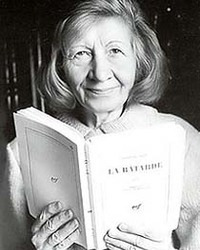
1907 – Violette Leduc, French author, born (d.1972); Leduc was born in Arras, Pas de Calais, France, the illegitimate daughter of a servant girl, Berthe. In Valenciennes, the young Violette spent most of her childhood suffering from poor self-esteem, exacerbated by her mother's hostility and overprotectiveness. She developed tender friendships with her grandmother Fideline and her maternal aunt Laure. Her formal education, begun in 1913, was interrupted by World War I. After the war, she went to a boarding school, the Collège de Douai, where she experienced Lesbian affairs with a classmate and a music instructor who was fired over the incident.
In 1926, Leduc moved to Paris and enrolled in the Lycée Racine. That same year, she failed her baccalaureate exam and began working as a telephone operator and secretary at Plon publishers.
In 1932 she met Maurice Sachs and Simone de Beauvoir, who encouraged her to write. Her first novel L'Asphyxie (In the Prison of Her Skin) was published by Albert Camus for Éditions Gallimard and earned her praise from Jean-Paul Sartre, Jean Cocteau and Jean Genet.
In 1955, Leduc was forced to remove part of her novel Ravages because of sexually explicit passages describing lesbianism. The censored part was eventually published as a separate novella, Thérèse and Isabelle in 1966. Another novel, Le Taxi caused controversy because of its depiction of incest between a brother and sister.
Leduc's best-known book, the memoir La Bâtarde, was published in 1964. It quickly became a bestseller. She went on to write eight more books, including La Folie en tête (Mad in Pursuit), the second part of her literary autobiography.
In 1968 Radley Metzger made a film of Leduc's novel Thérèse and Isabelle. The film was a commercial feature about adolescent lesbian love, starring Essy Persson and Anna Gael.
Leduc developed breast cancer and died aged 65 after two operations.

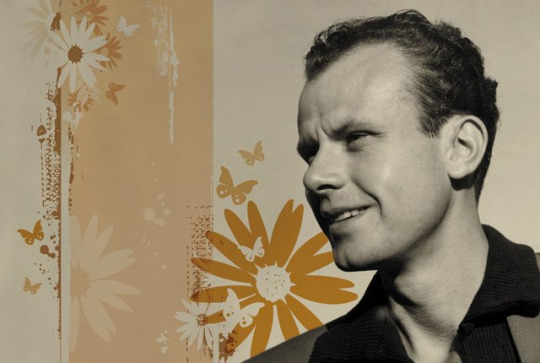
Young Harry Hay - Activist
1912 – Harry Hay, the founder of the Mattachine Society and the Radical Faeries, was born on this date (d.2002).
Although Harry Hay claimed 'never to have even heard' of the earlier Gay liberation struggle in Germany - by the people around Adolf Brand, Magnus Hirschfeld and Leontine Sagan - he is known to have talked about it with European emigres in America including Mattachine co-founder Rudi Gernreich. (However, Gernreich arrived in America at age 14, and Hay had already written his Gay manifesto when they met).
Hay, along with Roger Barlow and LeRoy Robbins directed a short film Even As You and I (1937) featuring Hay, Barlow, and filmmaker Hy Hirsh. A married man (beard/wife Anita Platky) and a member of the Communist Party USA, Hay composed the first manifesto of the American Gay rights movement in 1948, writing:
"We, the Androgynes of the world, have formed this responsible corporate body to demonstrate by our efforts that our physiological and psychological handicaps need be no deterrent in integrating ten percent of the world's population towards the constructive social progress of mankind."
Hay soon dispensed with the apologetic language and ideas. Though it may seem very dated today, the group was very radical compared to the rest of society at the time. It and Hay were among the first to advance the argument that Gay people represented a "cultural minority" as well as being just individuals, and even called for public marches of homosexuals, predicting later Gay pride parades.
Hay's concept of the "cultural minority" came directly from his Marxist studies, and the rhetoric he and his colleague Charles Rowland employed often reflected the militancy of Communist tradition. As the Mattachine Society grew with chapters around the country, the organization saw the Communist ties of its founders, including Hay, as a threat during that McCarthy-ite witch-hunt era, and expelled them from leadership. The organization took a more cautious tack so that by the time of the Stonewall riots the Mattachine Society came to be seen by many as stodgy and assimilationist.
The Communist Party did not allow Gays to be members, claiming that homosexuality was a 'deviation'; perhaps more important was the fear that a member's (usually secret) homosexuality would leave them open to blackmail and was a security risk in an era of red-baiting. Concerned to save the party difficulties, as he put more energy into the Mattachine Society, Hay himself had approached the CP's leaders and recommended his own expulsion. However, after much soul-searching, the CP, clearly reeling at the loss of a respected member and theoretician of 18 years standing, refused to expel Hay, instead dropping him as a 'security risk' but ostentatiously announcing him to be a 'Lifelong Friend of the People'.
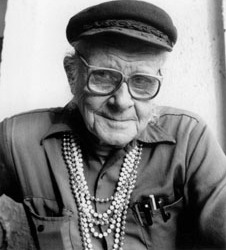
Hay in later years
Hay later became an outspoken critic of Gay assimilationism and went on to help found both Jesse Jackson's Rainbow Coalition and the Gay men's group the Radical Faeries, as well as being active in the Native American movements.
Hay once explained,
"We pulled an ugly green frog skin of heterosexual conformity over us, and that's how we got through school with a full set of teeth. We know how to live through their eyes. We can always play their games, but are we denying ourselves by doing this? If you're going to carry the skin of conformity over you, you are going to suppress the beautiful prince or princess within you."

Harry Hay and the Radical Faeries
In 1963, at age 51, he met an inventor named John Burnside, who became his life partner. They lived first in Los Angeles, and later in a Pueblo Indian reserve in New Mexico. After returning to Los Angeles to help organize the first Radical Faerie gathering, the couple moved to San Francisco, where Hay died of lung cancer at age 90. Hay was the subject of the 2002 documentary by Eric Slade, "Hope along the Wind: The Life of Harry Hay" (2002).

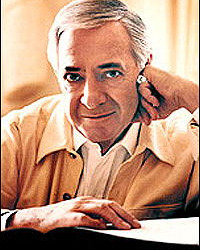
1912 – Academy Award nominated songwriter Jack Lawrence was born on this date (d.2009). He wrote about his being Gay in his 2004 autobiography, They All Sang My Songs. He was a gay man during a time when it was astronomically difficult to be one.
In addition to fun stories about divas ranging from Tallulah Bankhead to Cher, his book They All Sang My Songs covered his discreet queer life (he was closeted until sometime in his thirties), during which he attended gay "rent parties" in Harlem, and cruised Central Park for sex.
In 1945, met the love of his life, Walter Myden, who remained with Lawrence until he died 30 years later. Then Lawrence and Richard Debnam—who actually became Richard Lawrence when Jack adopted him in 1979—shared their love, with Richard more like the son he never had, Jack explained. "I think I would've been a good parent," the songwriter said, adding that not having children may have been his one regret. His songs, though, will live on longer than any child would have.
You probably know his songs through recordings like the Ink Spots' "If I Didn't Care", Rosemary Clooney's "Tenderly" and Frank Sinatra's "All Or Nothing At All" which was Sinatra's first solo hit.
Hearing his music now one can hear the sentiment of one who had to shield his life, or fight for its full acceptance, especially in "All Or Nothing At All" which has been recorded by Sinatra, Jimmy Scott, John Coltrane, Chet Baker and Diana Krall, to name just a few of its interpreters. Reading those lyrics it's easy to take it as an anthem of living and loving openly.
Lawrence died on March 16, 2009 at age 96 after a fall in his home in Redding, Connecticut. He was survived by Richard Debnam-Lawrence.


1915 – Gay diva and Jazz legend Billie Holiday was born today (d.1959). Nicknamed "Lady Day" by her friend and musical partner Lester Young, Holiday had a seminal influence on jazz and pop singing. Her vocal style, strongly inspired by jazz instrumentalists, pioneered a new way of manipulating phrasing and tempo.
Critic John Bush wrote that Holiday "changed the art of American pop vocals forever." She co-wrote only a few songs, but several of them have become jazz standards, notably "God Bless the Child," "Don't Explain," "Fine and Mellow," and "Lady Sings the Blues." She also became famous for singing "Easy Living," "Good Morning Heartache," and "Strange Fruit", a protest song which became one of her standards and was made famous with her 1939 recording.
Billie lived it up with a vengeance, and had a huge appetite for drink, drugs, men and women. She had an affair with actor and director Orson Welles, and also had a number of lesbian affairs - including one with Tallulah Bankhead. According to one of the later and better biographies she would call herself 'William' when she was sexually interested in a particular women.
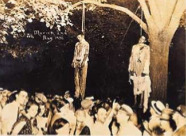
STRANGE FRUIT
Southern trees bear a strange fruit,
Blood on the leaves and blood at the root,
Black body swinging in the Southern breeze,
Strange fruit hanging from the poplar trees.
Pastoral scene of the gallant South,
The bulging eyes and the twisted mouth,
Scent of magnolia sweet and fresh,
And the sudden smell of burning flesh!
Here is a fruit for the crows to pluck,
For the rain to gather, for the wind to suck,
For the sun to rot, for a tree to drop,
Here is a strange and bitter crop.
As Billie Holiday later told the story, a single gesture by a patron at New York's Café Society, in Greenwich Village, changed the history of American music in early 1939, the night when she first sang "Strange Fruit." Café Society was New York's only truly integrated nightclub outside Harlem, a place catering to progressive types with open minds. But Holiday was to recall that even there she was afraid to sing this new song, and regretted it, at least momentarily, when she first did.
"There wasn't even a patter of applause when I finished," she later said. "Then a lone person began to clap nervously. Then suddenly everyone was clapping."
The applause grew louder and less tentative as "Strange Fruit" became a nightly ritual for Holiday, then one of her signature songs, at least where it could be safely performed. And audiences have continued to applaud this disturbing ballad, unique in Holiday's oeuvre and in the American popular- song repertoire, as it has left its mark on generations of writers, musicians, and listeners, both black and white. The late jazz writer Leonard Feather once called "Strange Fruit" "the first significant protest in words and music, the first unmuted cry against racism." Jazz musicians still speak of it with a mixture of awe and fear - "When Holiday recorded it, it was more than revolutionary," said the drummer Max Roach – and perform it almost gingerly. "It's like rubbing people's noses in their own shit," said Mal Waldron, the pianist who accompanied Holiday in her final years. A few years back a British music publication, Q Magazine, named "Strange Fruit" one of 10 songs that actually changed the world.

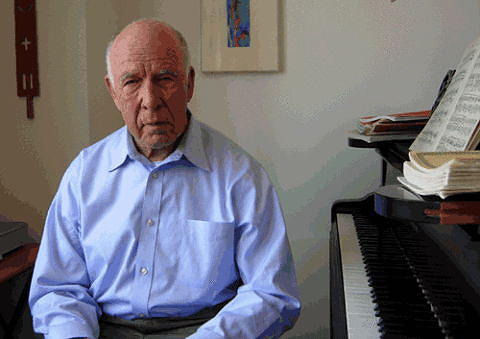
1919 – Theophilus Brown (d.2012) was an American artist. He became prominent as a member of the Bay Area Figurative Movement.
A descendant of early-American intellectuals, Brown was born in Moline, Illinois. His great-grandfather was friends with Ralph Waldo Emerson and Henry David Thoreau. Brown's father was an inventor and chief designer, at the John Deere Company in Moline, Illinois.
While attending Yale University in the late-1930s, Brown met composer Paul Hindemith and poet May Sarton, with whom he would share lifetime friendships.
After graduating in 1941, Brown was drafted in World War II. Following his discharge, he began to study painting, moving between New York City and Paris, meeting an impressive range of artists that included Pablo Picasso, Braque, Giacometti, Balthus, and de Kooning, among others. Brown, who studied piano at Yale, was also close to a number of composers, including John Cage, Francis Poulenc, Samuel Barber, and Igor Stravinsky.
In 1952 Brown enrolled in the graduate studio program at the University of California, Berkeley, joining a group of artists—including Richard Diebenkorn David Park, Elmer Bischoff, James Weeks, and Nathan Oliveira —that would later be known as the Bay Area Figurative Movement. While attending Berkeley, Brown also met and fell in love with his long-time partner and fellow-painter, Paul Wonner.
In the early 1960s, Brown and Wonner moved to Santa Monica, where they developed a close friendship with fellow gay couple, novelist Christopher Isherwood, and portrait artist Don Bachardy. Over the years, Brown and Wonner also fostered friendships with playwright William Inge, composer and conductor Andre Previn, actress Eva Marie Saint and her husband, director Jeffery Hayden, and New Zealand novelist Janet Frame.
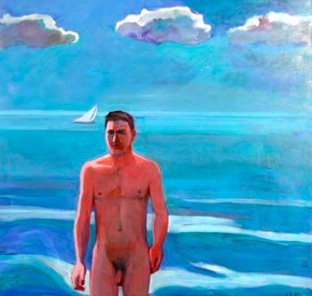
Figurative 1964
In his later years, Brown still managed to paint daily. Theophilus Brown resided in San Francisco, California at the time of his death. Four months before his death, Brown gave an interview in which he fact-checked his Wikipedia entry. He found the entry accurate, on the whole, but termed his classification as an abstract expressionist "horseshit." He died in San Francisco, aged 92.


1966 – The first Gay Community Center in the United States opens. It is located in San Francisco, led by The Society for Individual Rights.


1991 – Travis Flores is an American activist, philanthropist, motivational speaker, actor and children's book author. He has been featured in works such as Chicken Soup for the Soul, Readers Digest: Selections, Charlie's Cancer Rescue and The Lemonade Stand. Flores has cystic fibrosis and has spoken very openly about it, having served as a spokesperson for various cystic fibrosis related fundraisers. He is best known for his charitable work with both the Make-A-Wish Foundation and the Cystic Fibrosis Foundation, and has donated a majority of his book's proceeds to the two organizations. To date, he has helped to raise over half a million dollars for the Cystic Fibrosis Foundation. Flores also established his own organization in 2005, which provides laptops to chronically ill youth in hospitals.
When Flores was twelve years old, he began work with illustrator Michelle Ciappa to prepare his children's book, "The Spider Who Never Gave Up", for publishing. In 2004, after the book was published when Flores was thirteen, he began a motivational speaking and book tour. In the same year, June 18 was proclaimed by Mayor Michael Mullen as "Travis Flores Day" in Marietta, Ohio; a city near his hometown of Newport, Ohio. A year later, Flores partnered with Disney to print an edition of his book for a Make-A-Wish Foundation event, in which two million dollars was donated to the charity. The media attention and success of the event enabled Flores to extend his tour another two years.
Flores started college when he was sixteen years old and received his bachelor's degree in Acting from Marymount Manhattan College by the age of twenty. In 2010, during his work as an undergraduate student, he had the opportunity to work with Susan Batson on the Broadway workshops of the Tennessee Williams play, In Masks Outrageous and Austere. In 2012, the play opened at Culture Project theater in New York City, but Flores was no longer affiliated with the project. While working in New York City, he attended New York University and graduated in Spring of 2013 with a master's degree in Fundraising.
On March 3, 2015, Flores successfully received a double-lung transplant at Ronald Reagan UCLA Medical Center. Following the operation, he continued his work in entertainment, and later underwent a second double-lung transplant October 3, 2017 at the same medical facility.
In May 2019, Flores came out as gay on the CW series MyLastDays, making him the first person to ever come out on the network. Flores currently resides in Los Angeles, California with his male partner. He continues to pursue his philanthropic outreaches, acting, and writing.


12 notes
·
View notes
Note
Hiiiiii I have a Käärijän prompt: they take a walk together in Slovenia and maybe they have their first kiss?
OOOOOOO exciting! I am incapable of writing fluff, so i added a little bit of feelings and pining (tm):
No castle is grander than the one Bojan takes Jere to. It's more of a fancy residence than a usual European fortress, and it's small--but it's out-of-the-way and quiet, and that's all Jere needs.
He hadn't realised just how exhausted he was until he sat on the plane to Ljubljana, with the weight of the past twelve months pressing down on his chest like some sleep paralysis nightmare. Or maybe it was just the shitty air-pressure in the cabin. He didn't dare let go of the tension even when Bojan went to pick him up at the airport, at least not until they were in Bojan's apartment - cleaned in a haphazard I'm doing this for the guests way - and on the couch.
Jere let out a deep sigh then, and perhaps it was the sign Bojan had been waiting for. He'd been reserved, mostly just glancing at Jere with a small smile, and Jere'd been wondering why through the whole ride.
'What do you wanna do?' Bojan asked quietly.
'Sleep,' Jere mumbled, exhausted. He hadn't come to visit Bojan just to sleep, but his muscles finally let go in a way that he had completely forgotten he was capable of.
So Bojan planned activities that didn't require too much energy. A holiday, a proper holiday, he said. And Jere felt a bit guilty at the start, because he wanted both of them to have fun, and lazing around was definitely not fun.
It was on the third day that they drove to the castle some way from Ljubljana. Jere spent most of the ride taking photos and capturing videos of the landscape to send home. Nothing would be posted online, they had agreed, after Bojan suggested it; Jere hadn't been sure why exactly, but he didn't mind. It was just as much Bojan's holiday as Jere's.
The castle was nestled by the border of a forest, on the foothills of a mountain. Gentle rolling hills. Pretty. In the group chat, Tomi sent him a bunch of jealous emoticons after the photos. I'm a fucking king, bro, Jere told them, attached to a photo of the villa. All he got back was a bowing emoji, and then Bojan was pulling up to the parking lot.
Their room had one king-sized bed. King of the fucking universe, Jere thought to himself. It made him laugh out loud nearly, until Bojan's vastly different reaction cut him off.
'Fuck me,' Bojan groaned upon seeing their room. He must've made the booking beforehand. 'I asked for two beds. I'll just--'
'Is fine,' Jere blocked Bojan's path with his suitcase. 'One bed, one cup of tea.'
It took Bojan a moment to remember, but the way his face lit up and the creases between his eyebrows smoothed out eased Jere's mood too.
There is a rampart of sorts, and a tower to walk up to for the hotel guests. It overlooks the valley, and has a nice view of the surrounding mountains. It's some Lord of the Rings type beauty, Jere has to admit.
On the narrow rampart, their hands brush. It's electrifying. Jere wants to grab Bojan's hand--they are the only ones there, and even if there were others, it wouldn't be their fucking business. It's only Bojan's reservation that keeps Jere's hands at his sides, awfully conscious.
They stand close, shoulder to shoulder, looking at the landscape. Jere likes the mountains, can't tear his eyes off of the peaks. He wants to be there--he wants to be here. Never leave. Buy a castle of his own and live there.
'Tomorrow we go there?' Jere asks, pointing at the mountains. His gaze returns from the hike, and settles, for a moment, on their hands resting next to each other on the rough stone. He looks at Bojan.
Bojan has been staring at him. It's a particular look that Jere has seen a few times before, in Liverpool. It's that look when Bojan goes contemplative--
'Sure, we can,' Bojan smiles, and steps around Jere to proceed up the tower. His palm, however, slips over Jere's knuckles and stay there for as long as it takes Bojan to step away.
That night, they barely sleep a few hours, because neither of them can say good night. Words come spilling into the darkness, because even now, even with Bojan and after all this time of talking about his feelings, the complete darkness gives Jere the absolute courage to reach into the deepest parts of him and show it--because Bojan won't see it, he can't see in this darkness. And Jere's English words are crusty. He wishes Bojan could speak Finnish.
They talk about the future and the past. The sum of the two is them, lying on the same bed, facing each other. Jere wishes he could see Bojan, wishes he could reach out and make sure he's there in the flesh and it's not just an illusion of his deep voice. It's a fucking nightmare. He's not afraid in the dark but a lamp would come in handy. Any other time he would not think twice touching Bojan, but still there is an aura of reservation around his friend, like he's holding back.
'What is wrong?'
Bojan opens his mouth--Jere can hear his lips separate. His tongue is dry, he should drink. The sound is obscene and comforting. A breath.
'Can't sleep.' Jere thinks, don't want to sleep.
'Me too can't,' Jere says, barely above a whisper. He shifts, shoulder growing numb, until his left arm is not underneath his body, but lying between them. He pretends that should he flex his fingers, he could touch Bojan.
'I'm--' Bojan speaks, voice gravelly. 'So glad you could make it. Really.'
'Me too.' Jere smiles to himself. His eyelids feel heavy. He doesn't want to sleep. 'I missed you, Bojan.'
Then.
Something presses again his fingers.
Bojan hooks his little finger around Jere's.
'Missed you too.' And Jere can hear him smile.
It is so much easier to do something under the aegis of darkness. It's emboldening, like adrenaline or alcohol without the inevitable crash or hangover. And thus, darkness is most dangerous to act under.
Jere feels it before he hears it:
Bojan moves closer, the mattress dips, skin presses against his. The sheets rustle, and Bojan breathes loudly. His fingers have slipped into Jere's grasp.
A presence hovers above him, but he can only see a vague silhouette. Nothing weighs on him anymore.
Jere angles his chin, and the tip of Bojan's hair brushes his nose.
The night gives both of them courage: for Jere to lift his head, and Bojan to lower his lips.
#fhuuuhh#this took longer than anticipated#had to delete some unnecessary parts#jere is hard to write i cant see into his head#bojan is much easier to grasp#käärijan#sorry it took so long
23 notes
·
View notes
Quote
The common factor in the experiences of Eleanor of Provence, Isabella of France and Margaret of Anjou is marriage to a king who failed to fulfil his duties effectively, thereby losing the support of his people. A weak king provided the opportunity for his queen to exercise power on his behalf but this was regarded with deep suspicion by contemporary observers, invariably resulting in condemnation and criticism of her actions. Such judgements should therefore be seen as a reflection of contemporary attitudes and prejudices towards women in positions of power rather than any fair assessment of the abilities or shortcomings of the queens themselves.
Diana Dunn, "The Queen at War: The Role of Margaret of Anjou in the Wars of the Roses" in War and Society in Medieval and Early Modern Britain (ed. Diana Dunn, University of Liverpool Press, 2000)
#margaret of anjou#isabella of france#eleanor of provence#queenship#reputation and representation#historian: diana dunn
35 notes
·
View notes
Photo

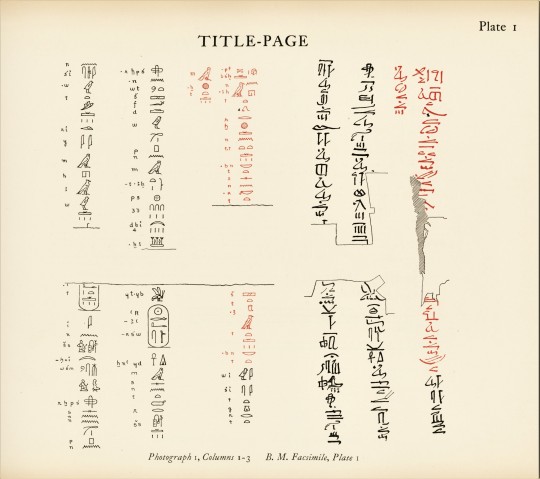
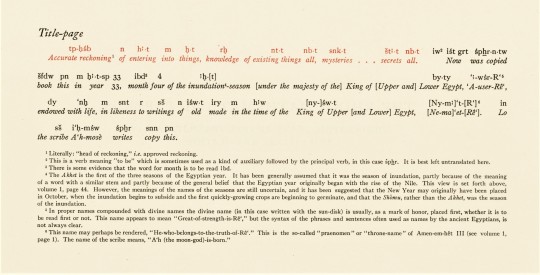
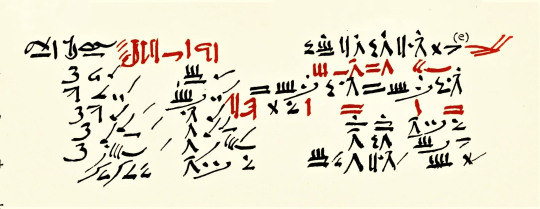


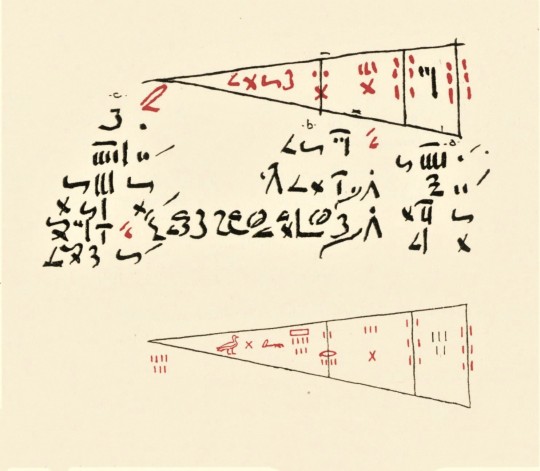
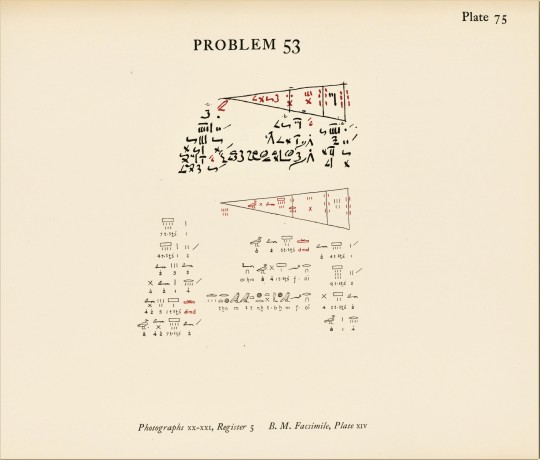


An Egyptian Mathematics Science Saturday
While Archimedes of Syracuse (287-212 BCE) is often considered the first to calculate the value of Pi (π), the Egyptians got pretty darn close a millennium and a half or so earlier, as evidenced by the Rhind Mathematical Papyrus. Copied by the scribe Ahmes sometime around 1650 BCE from an earlier text, the papyrus gives us a remarkable insight not only into Egyptian mathematics but also customs and culture, from taxation and farming practices to the exchange rate between beer and bread. It is named after Scottish antiquarian Alexander Henry Rhind, who acquired the papyrus sometime around 1858. Held by the British Museum since 1865, it is now suspected that the papyrus entered the antiquities market as a result of illegal excavations.
Our facsimile of the papyrus was the result of fifteen years of scholarship by mathematician Arnold Buffum Chace. The first volume was published in Oberlin, Ohio by the Mathematical Association of America in 1927, with the second volume following in 1929. All of the above images are from the second volume, which contains photographs of the papyrus, as well as transcription transliterations and literal translations by Chace. Chace was assisted in his work by mathematician Henry Parker Manning and Egyptologist Ludlow Seguine Bull. Also included in the second volume is a supplement to the “Bibliography of Egyptian Mathematics” from the first volume, both of which were prepared by Raymond Clare Archibald.
The first publication of the Rhind Papyrus was a translation into German in 1877 by August Eisenlohr. The Mathematical Association of America publication was part if a flurry of new scholarship surrounding the papyrus following advancements in scholarly understanding of Egyptian writing. In the preface to our edition, Chace notes the important 1923 translation by Eric Peet published by Liverpool University Press. Chace remarks that “Egyptologists ... will find philological matters fully discussed by Professor Peet,” while he intended for his work to be geared towards both mathematicians and the general public.
Both volumes were originally donated to the Library of the State Teachers College Milwaukee by the Carnegie Corporation of New York with their bookplate.
Check out more Science Saturday posts here.
-Olivia, Special Collections Graduate Intern
#Science Saturday#Rhind Papyrus#Rhind Mathematical Papyrus#Ahmes#Ahmose#Alexander Henry Rhind#Arnold Buffum Chace#Arnold Chace#Mathematical Association of America#Henry Parker Manning#Ludlow Seguine Bull#Raymond Archibald#August Eisenlohr#Eric Peet#Mathematics#Mathematics in Antiquity#Antiquities#Papyrus#olivia
34 notes
·
View notes
Text
13 x reader

Mind Palace
Warnings: self deprication??
This is more of a vent story about how I've been feeling recently. ADHD can really mess with you at time. Now, I am a girl and this is just how my ADHD affects me so if you can't relate, please don't attack me. Maybe spelling mistakes? I wrote this in ten minutes. Maybe I'll write a second part some time?
--------------------------------------
It had been a few days since our last adventure and I was raring to go on another. Having a condition that made your brain feel like it was on fast forward, was really irritating at times. Jumping down the steps, I joined the rest at the console and smiled at them happily.
"So, where are we going now?" I asked, excited at the idea of a new planet or experience. Dan looked at me and sighed.
"Actually, I've asked the doc to drop us off home. Need a rest you know?" Face falling slightly, I looked between them both.
"Both of you?" Yaz just nod at me.
"Yeah, I wanna see my family and do a bit of work." Swallowing down my disappointment, I stood back and rested my hand on the console.
"Yeah, of course." Feeling the tardis land, we dropped yaz off first before heading on to Liverpool. Dan waved at us then left briskly. I turned to the doctor, my gaze down to the metallic floor.
"You can drop me off n-"
"I'm not taking you home." Head shooting up, she smiled at me before sending us off into space once more.
"Before we do anything, I do want a chat. If that's okay?" Confused, I agreed and quickly followed after the blonde when she left the main room. After a minute, we entered a room that was a cross between a library and a living room. There was a plush brown couch situated in front of a lit fire. Book cases lined the rooms and there was a pile of blankets in the corner.
"Get comfortable." Doing as she said, I sat on the couch and pulled my knees up to my chest out of reflex. Joining me, the doctor gave a kind smile before holding my hand.
"I've never seen you look so heart broken. Why didn't you want to go home?" Her question caught me off guard and I could tell that she suspected something bad. Shaking my head quickly, I laughed a little.
"My home is very safe doctor. I'm just- When plans change or, I make plans in my head and they get ruined, it really bothers me." I explained slightly embarrassed. It always sounded selfish saying these thoughts out loud.
"I have ADHD. Its different in how it affects each individual. For me, I need to constantly be doing something. Or have something to look forward. Or else, what's the point?" Staring at our joined hands, I took notice of how pretty and slender hers were. Why hadn't i seen that the many other times we'd held hands? Shaking my head from the distractions, I carried on.
"Its selfish i know. But my head feels like there's a million tiny people running around and continually screaming at me to do something. I need activity." Pressing my lips together, I almost squeaked in surprise when the doctor moved over to my side and pressed herself against my side. She looked at me with intent, as if I was the most interesting person in the universe.
"You need constant distraction from your own feelings. Your own self conscience is out to get you." All I could do was nod dumbly at her observing. We were so close and I could feel the blush crawling up my skin.
"I dont think it's selfish by the way. You can help they way you think, love." Now I definitely was blushing. Where did that name come from? Either way, I relaxed knowing that I wasn't being judged.
"You're lucky you found me. We can do whatever you want, whenever you want. But. You do need a break sometimes okay? Even I do." Nodding my head at her words, the doctor beamed and wrapped her arms around me. Sinking I to her hold, my head rested on her chest, arms linked round her waist.
"Never be scared to tell me if this buzzing is overwhelming you. I can help. I'll be here." Tears welled up in my eyes but I didn't let them fall. My grip tightened on her, thinking back to back home. I was always alone. So hard to make friends and everyone so busy.
"I'm so used to being shut down. To people not understanding. They tell me that i can't be like that. That it's not fair. That it's not all about me." Chewing on my lip, I almost drew blood.
"I know it's not about me. I just want to have fun, is that a crime? Why does no one ever wa-" choking up, I cut myself off accidentally. The doctor sat me up worriedly and wiped my eyes gently.
"Hey, its okay. I'm here for that now. I'm more than happy to be there when you feel like this." Sniffling, I looked at her doubtfully. I just couldn't believe it. Not when my own mother wouldn't give me the time when I needed it. No matter how much I explained how I felt, it was pushed aside.
"Why? Im-...its pretty pointless. No?"
"No. Not at all. Spending time with you? I couldn't think of anything better." Not being able to surpress my smile, I threw myself at her. Face buried into her neck, my arms hung over her shoulders loosely. The doctor rubbed my back and chuckled at my actions.
"I've got a whole universe to show you darling. So you better now back out on me now." Laughing, I pulled away and kissed her cheek affectionately. Not minding the colour her cheeks were gaining, I simpered.
"Of course I won't. Not ever."
#13th doctor x reader#thirteenth doctor x reader#the doctor x reader#doctor who x y/n#doctor who x reader
48 notes
·
View notes
Text
“BMCR 2020.08.24
Herodotus. Histories. Book V
P. J. Rhodes, Herodotus. Histories. Book V. Aris & Phillips classical texts. Liverpool: Liverpool University Press, 2019. ix, 263 p.. ISBN 9781789620153 £22.99 (pb).
Review by
Charles Chiasson, The University of Texas at Arlington. [email protected]
Professor Rhodes’ edition of Book 5 is the first book of Herodotus’ Histories to appear in the Aris and Phillips series, which aims to accommodate readers with rudimentary knowledge of ancient Greek. (Rhodes plans a companion edition of Book 6 to carry the narrative of Greco-Persian conflict through the battle of Marathon in 490 BCE.) The choice of this book is a good fit for the editor’s primarily historical interests, as it includes Herodotus’ accounts of the Ionian Revolt; the end of the Peisistratid tyranny and the beginning of more democratic rule in Athens; and Spartan attempts to expand its political influence in Greece beyond the Peloponnese. The book also contains some of Herodotus’ most memorable literary creations—characters, scenes, and speeches introduced to underscore important historical moments, such as Aristagoras’ brazen attempt to secure military aid from the Spartan king Cleomenes, and the Corinthian Socles’ pivotal speech opposing the Spartan re-establishment of tyrannical rule in Athens.
This edition includes an introduction with bibliography, a Greek text with facing English translation, and a commentary of approximately 100 pages.
The introduction is suitably substantial and covers essential background to orient the novice, although even Herodotean veterans will find points of interest along the way. Rhodes lucidly covers the evidence for Herodotus’ life, the ‘publication’ of the Histories (likely to have involved public recitals before full written publication in the mid-420’s), and Herodotus’ use of (primarily oral) sources. In judging the reliability of Herodotus’ hotly debated source citations, Rhodes advocates a middle course between extreme skepticism and extreme credulity, in the belief that Herodotus probably “wrote what he honestly thought he remembered” (11), although his memory may have failed him occasionally. Rhodes makes an explicit exception of the Persian Constitutional Debate, which he considers (despite repeated Herodotean claims to the contrary) a product of 5th-century Greece rather than 6th-century Persia.
In discussing Herodotus’ language, narrative techniques, and beliefs, Rhodes rightly acknowledges the importance of Homeric precedent: his epics serve as a model for Herodotus’ long narrative, set in multiple locales and enlivened by frequent speeches and occasional epic locutions. Moreover, Rhodes finds further justification for Pseudo-Longinus’ description of Herodotus as “most Homeric” at a deeper thematic level. He endorses John Gould’s view that Herodotus’ focus on the vulnerability of human existence and prosperity, his “sympathetic engagement with human suffering” (18),[1] has distinctly Homeric roots.
Other topics addressed by Rhodes include Herodotus’ political beliefs and the extent to which the Histories acknowledge or allude to political developments in the Greek world that took place after the end of the narrative in 479. Rhodes shares the now popular view that Herodotus is neither pro-Athenian nor pro-Spartan, and in broad terms prefers free constitutional government over one-man rule (whether Oriental monarchy or Greek tyranny). As for the relationship between Herodotus’ narrative of the past and contemporary Hellenic politics (especially the polarization between imperial Athens and Sparta, with their respective allies), Rhodes defends the conservative view that Herodotus’ primary objective is the one he announces explicitly in his opening sentence—i.e., to write about great deeds of the past in Homeric fashion.
Rhodes devotes the second section of his introduction (pp. 34-43) to the history of contact and conflict between the Greeks and Persians, from the Hellenic migrations to the Aegean islands and Asian coast during the Dark Age through the invasion of Xerxes and its aftermath. The introduction concludes with an outline summary of Book 5, which helps the reader navigate the complexities of the text, with its frequent changes of place and time, and demonstrates (inter alia) Herodotus’ enthusiastic embrace of analepsis: almost half of the book consists of flashbacks into Spartan and Athenian history (chaps. 39-97), which help explain the divergent reactions of the two communities when Aristagoras comes calling in search of military aid against the Persians.
The depth and breadth of erudition that Rhodes brings to bear upon the text can be gleaned from his lists of references at pp. vii-ix (collections of inscriptions, other prose and poetic texts, and journals in various languages) and pp. 45-48 (a select bibliography of Herodotean texts, commentaries, translations, and reference works). One work that Rhodes cites often throughout his commentary is R. J. A. Talbert’s Barrington Atlas,[2] which helps to compensate for the minimal cartographic resources available in this volume: three black-and-white maps (a page each for Magna Graecia, Greece and the Aegean, and the Near East) that precede the introduction.
Rhodes describes the Greek text that he prints as his own in “all the substantial matters which seemed to call for a decision” (Preface p. v), while following N. G. Wilson’s 2015 Oxford Text with regard to the spelling of Herodotus’ eastern Ionic dialect. In terms of general editorial practice, Rhodes parts company with Wilson in his greater willingness to defend rather than emend the transmitted text. The text (like others in the Aris and Phillips series) has a minimal apparatus criticus; in his commentary Rhodes often discusses and justifies his choices, persuasively to my mind. True to his conservative textual creed, Rhodes introduces only a single conjecture of his own into the text (at 66.1).
In the Preface (p. v) Rhodes declares that the primary task of his translation is “to express the meaning accurately in good English,” which has resulted in his changing Herodotus’ sentence structure on occasion. To give readers some small sense of the result, here in Rhodes’ rendition is the opening of the speech given by the Corinthian Socles to the Spartans and their allies at 5.92:
”Indeed heaven will be below the earth and earth up in the air above the heaven, and mankind will have a life in the sea and fish the life which mankind previously had, when you, Spartans, are prepared to overthrow equalities of power and restore tyrannies to the cities, something than which nothing is more unjust among mankind or more bloodthirsty.”
For comparative purposes, here is the same passage as translated by Robin Waterfield:[3]
“Whatever next?” he said. “Will the heavens be under the earth and the earth up in the sky on top of the heavens? Will men habitually live in the sea and fish live where men did before? It’s a topsy-turvy world if you Lacedaimonians are really planning to abolish equal rights and restore tyrants to their states, when there is nothing known to man that is more unjust or bloodthirsty than tyranny.”
However brief the sample, the juxtaposition underscores both strengths and weaknesses of Rhodes’ approach. On the one hand, and despite his stated concern about infidelity to Herodotus’ text, Rhodes in this instance (and as a general rule) reproduces the sentence structure of the original almost without deviation. The result is unquestionably accurate if occasionally awkward (“something than which…”). By contrast, Waterfield’s translation is freer and livelier, turning a long single declaration into a series of indignant questions that are truer to the spirit than the letter of Herodotus’ text. Rhodes’ more conservative approach is appropriate, however, given the purpose and the audience of this edition.
In his commentary (as in his introduction) Rhodes claims to have been “particularly but not exclusively concerned with the subject-matter: the history which Herodotus narrates, and how and why he narrates it as he does” (Preface, pp. v-vi). Of course the “history” that Herodotus narrates is famously wide-ranging, which requires that an editor be well versed in a wide variety of fields: not just history in the modern sense but also “deep” history (legend or myth), ethnography, geography, prosopography, epigraphy, and religion, among others. In short, Professor Rhodes has a masterful command of this wide spectrum of knowledge, and a gift for expressing it clearly and concisely. Rhodes serves the needs of readers new to Herodotus in various ways. For example, he consistently notes how Herodotus organizes his narrative by means of ring composition and analepsis. His descriptions of the nuts and bolts of the Athenian and Spartan governmental systems are clear without being reductive. He intervenes as necessary to explain potentially mystifying aspects of Greek religious practice, like the status of the local gods Damia and Auxesia, whose theft explains the origins of the hostility between Athens and Aegina (chaps. 82-86); or the hero cult established for the decapitated Cyprian rebel Onesilaus after a swarm of bees builds a honeycomb in his head (chap. 114).
At the same time, seasoned Herodoteans will appreciate his even-handed citation and assessment of previous scholarship, including frequent references (some approving, some dissenting) to Simon Hornblower’s recent edition of book five in the Cambridge ‘green and yellow’ series.[4] A sample passage where Rhodes must entangle all manner of scholarly problems is the post-tyranny transition in Athens to Cleisthenes’ rule (chaps. 66-81), where his discussion is informed by a wide range of primary witnesses (Thucydides, Plutarch, and the Aristotelian Constitution of the Athenians for starters) and secondary scholarship from the likes of Sarah Forsdyke, Ernst Badian, and Josiah Ober. Rhodes wears his learning lightly, and seldom lets his scholarship impede intelligibility.
On occasion Rhodes’ historical focus prevents him from acknowledging points of broader narratological and literary interest. I have in mind especially one of my favorite scenes in book five, Aristagoras’ visit to Sparta and King Cleomenes in search of allies in the Ionian Revolt against Darius. In this scene (5.49-51) Herodotus gives his readers yet another reason to dislike Aristagoras: he attempts (unsuccessfully) to pass himself off as an enquirer, like Herodotus, armed with geographical and ethnographical knowledge to inform a crucial political decision. He brandishes a map (recalling Herodotus’ own cartographic interests), describes the various foreign peoples en route to Sousa in much the same way that Herodotus describes non-Greek populations, and even adapts Herodotus’ signature superlative phrase in describing the Phrygians as “the richest in flocks of all whom I know, and in crops” (49.5). And yet Aristagoras repeatedly exaggerates the ease of conquering all of Asia, and ultimately defeats his own purpose by telling Cleomenes that the trip from Sardis to Sousa would last three months. As Herodotus wryly observes, Aristagoras “slipped” in this regard: “for he ought not to have told the truth, if he wanted to lead the Spartiates to Asia” (50.2). Rhodes declines to comment, when he might have called attention to both Herodotus’ humor and the crucial difference thus drawn between Aristagoras’ misleading historiē and its truth-based Herodotean counterpart.[5]
Nonetheless, this scarcely diminishes Rhodes’ impressive achievement throughout. This edition marks an auspicious beginning for Herodotus in the Aris and Phillips series; it provides a lucid and learned introduction to an author whose boundless curiosity requires informed explication by a “wise advisor” indeed, and Professor Rhodes unquestionably fills the bill. It is difficult for me to imagine, on this scale, a more informative historical commentary on book five.
Notes
[1] J. Gould, Herodotus (New York, 1989) 132.
[2] R. J. A. Talbert, ed., Barrington Atlas of the Greek and Roman World (Princeton 2000).
[3] R. Waterfield, Herodotus The Histories, with introduction and notes by C. Dewald (Oxford, 1998).
[4] S. Hornblower, ed., Herodotus Histories Book V (Cambridge 2013).
[5] D. Branscome, Textual Rivals: Self-Presentation in Herodotus’ Histories (Ann Arbor, 2013) 105-49.
Source: https://bmcr.brynmawr.edu/2020/2020.08.24/
6 notes
·
View notes